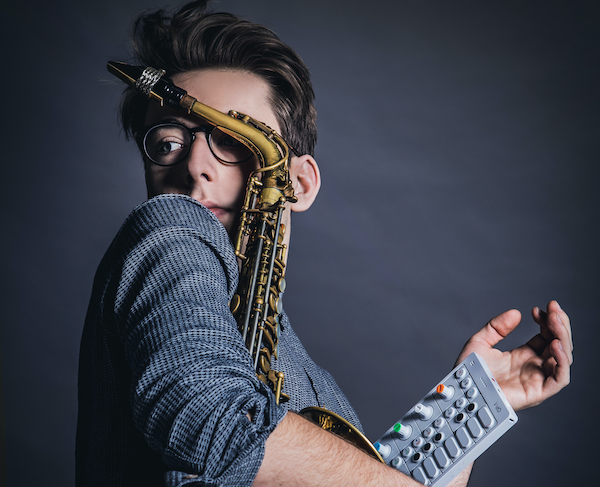Jan 13, 2026 2:09 PM
More Trump-Kennedy Center Cancellations
The fallout from the renaming of the John F. Kennedy Center for the Performing Arts to include President Donald…

Kuba Więcek is among the 25 artists DownBeat thinks will help shape jazz in the decades to come.
(Photo: Marcin Giba)Kuba Więcek is clicking the plunger of his pen with a kind of restlessness that’s manifested in his studies and the trajectory of his career.
“Every one or two years, my mind changes so much,” the saxophonist said recently from his home in Warsaw, Poland. “Before I went to study [at Conservatorium van Amsterdam], I was very much into doing my own music. I was not at all into playing just standards. I wanted to do my own music—very avant-garde. ... Teachers were forcing me to learn Lester Young and Sonny Stitt. I wasn’t so much into this.”
A change came when Więcek moved to Copenhagen and began attending Rhythmic Music Conservatory, where an onslaught of performance possibilities presented themselves, cementing his admiration for the jazz tradition. He’s gone on to develop a language and style on his instrument that encompasses the past and present. Compositions for Another Raindrop (2017) and Multitasking (2019) generally were restricted to short-form pop songcraft, giving his work a nervy edge. He favors staccato runs, injecting his band with a rhythmic nuance not unlike Shabakah Hutchings’ various groups but drawn from different points of reference. Więcek said that before hearing Kendrick Lamar’s 2015 To Pimp A Butterfly, he mostly was interested in jazz and classical music. But from jazz, he took away a lesson that’s pushed him to look beyond the trio he’s led for about four years.
“I really think the most important thing about being a jazz musician is this kind of openness for everything that happens—if you play a wrong note, you make something good out of it,” he said. “This is the most important thing for me in jazz—not even the language or harmony.”
With time provided by the pandemic-pause in touring, coupled with his willingness to experiment, Więcek has delved into electronic music. Early next year, the composer said he’s set to release an album with a Polish emcee, where he serves as producer. There will be some saxophone, but programmed beats, too.
“Making this electronic music and composing music in a very different way has changed my approach to composing acoustic music so much,” he said. “I used to study in Berlin with [drummer] John [Hollenbeck], and his way of composing, you have those cells, like minimalism. ... And when it comes to electronic music, it’s even more like this. I just have small fragments, but I can do even more with it. So, [now I have] opportunities that I didn’t think of before. I really think that doing electronic music is a very natural step for me. And it’s something when I came back to jazz, it helped me so much. And it will help even more as I get better at it.” DB
This story originally was published in the November 2020 issue of DownBeat. Subscribe here.

Belá Fleck during an interview with Fredrika Whitfield on CNN.
Jan 13, 2026 2:09 PM
The fallout from the renaming of the John F. Kennedy Center for the Performing Arts to include President Donald…

Peplowski first came to prominence in legacy swing bands, including the final iteration of the Benny Goodman Orchestra, before beginning a solo career in the late 1980s.
Feb 3, 2026 12:10 AM
Ken Peplowski, a clarinetist and tenor saxophonist who straddled the worlds of traditional and modern jazz, died Feb. 2…

The success of Oregon’s first album, 1971’s Music Of Another Present Era, allowed Towner to establish a solo career.
Jan 19, 2026 5:02 PM
Ralph Towner, a guitarist and composer who blended multiple genres, including jazz — and throughout them all remained…

Rico’s Anti-Microbial Instrument Swab
Jan 19, 2026 2:48 PM
With this year’s NAMM Show right around the corner, we can look forward to plenty of new and innovative instruments…

Richie Beirach was particularly renowned for his approach to chromatic harmony, which he used to improvise reharmonizations of originals and standards.
Jan 27, 2026 11:19 AM
Richie Beirach, a pianist and composer who channeled a knowledge of modern classical music into his jazz practice,…